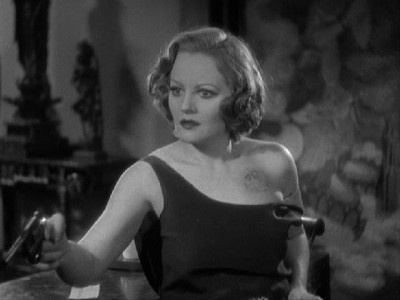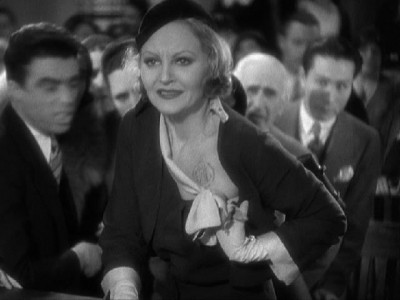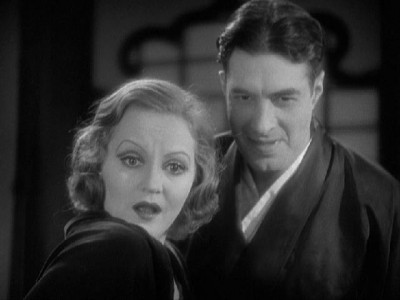
I don’t know that it’s fair to say that Tallulah Bankhead and the movies were a bad fit — I always find her dabblings in them enjoyable — but it’s impossible to deny that she never became a major movie star. Certainly, the five early talkies she made at Paramount did little to help. All of them were frankly, rather silly, and George Abbott’s 1931 remake of Cecil B. DeMille’s 1915 hit, The Cheat, is no exception. What had been daring — even shocking — in 1915 was considerably less so in 1931. (Whether Depression-era audiences much cared about the sexual antics of the rich folks out on Long Island may have had some bearing, too.) The original told the tale of a fairly empty-headed society woman who gambles away $10,000 in charity money and, rather than face disgrace, accepts a loan from a wealthy Japanese man who has designs on her. When her fortunes change, she tries to back out of the deal by paying him off, which results in him branding his mark on her shoulder. She then plugs the no-good galoot with his own shooting-iron (not fatally) and her husband takes the blame, but in court she reveals what the Japanese gentleman did to her, driving the people into a frenzy of racial indignation. The assembled crowd attacks the fellow, and all charges are dropped against the society woman and her husband.

This remake (Paramount remade it in 1923 as well) is fairly faithful to the mechanics of the story with two major changes. Paramount had already run into trouble with the original that caused them to change the race of the lecherous loan shark from Japanese to Burmese for a 1918 re-release. Here, he’s turned into Hardy Livingstone (Irving Pichel), a wealthy white man who has spent time in the East and has developed a passion for Asian exotica. In other words, he’s merely a degenerate with “heathen ways.” (In fact, he’s so degenerate that he brands the lady on her breast.) The other notable change is in the character of the society woman. Bankhead was hardly believable as a bubble-headed idiot, so she’s become a compulsive gambler — more unhinged than foolish. It largely works, except as concerns her devotion to her rather dreary and dumb husband (Harvey Stephens). The world-weary Bankhead just doesn’t ring true in that regard, but it hardly matters, since we’re here to see her overplay her role at every turn — and she’s very good at that.

Like Bankhead, stage director George Abbott was dabbling in the movies more than he was taking them seriously. He was part of that rush by Hollywood to acquire people whose stage experience allowed them to tackle this new monster of the talking picture. Abbott’s handling of the material is considerably less exciting than Bankhead’s scenery-chewing, but it’s not in the least stodgy. Unlike stage directors Rouben Mamoulian and James Whale, Abbott didn’t find the movies liberating, but he wasn’t cowed by them either. Overall, though, the film gets by more on that typical Paramount Pictures luminous quality — and Bankhead — than on anything the director brought to the mix.
The Hendersonville Film Society will show The Cheat Sunday, Nov. 3, at 2 p.m. in the Smoky Mountain Theater at Lake Pointe Landing Retirement Community (behind Epic Cinemas), 333 Thompson St., Hendersonville.




Hi Ken, just wanted to say how much I enjoy reading your reviews, there aren’t many critics these days that like all types of movies, or can actually appreciate when a movie was made.
Thank you
Dina Mattas
Australia
Why, thank you very much. A little validation is always nice!